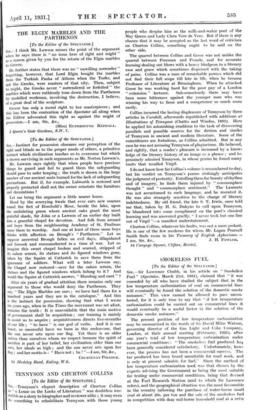[To. the Editor of the SPECTATOR.]
Sul,—Instinet for possession obscures our perception of the right and blinds us to the proper needs of others, a primitive instinct which civilization teaches us to overcome but which is shown surviving in such arguments as Mr. Norton Lawson's.
Mr. Lawson says rightly that when people have precious things to guard and fail to guard them the safeguarding should pass to safer keeping ; the truth is shown in the large number of our ancient seats burned for the lack of safeguarding precautions. But if, for example, Lulworth is restored and properly protected shall not the owner reinstate the furniture and decorations ?
Let me bring the argument a little nearer home.
Hard by the scurrying Swale that ever cuts new courses round the feet of Rombold's Moor, beside the lake, upon the undulating green where ancient oaks grant the most grateful shade, Sir John or a Lawson of an earlier day built him a graceful chapel for devotion. And folk from around and boys from the neighbouring Academy of St. Paulinus came there to worship. And one at least of these same boys thinks with affection on Brough's " Parthenon." Let us suppose ancestral Brough fallen on evil days, dilapidated and forsook and commandeered in a time of war. Let us imagine this sweet chapel broken and scarred, stripped of its oaken screen, its statues and its figured windows gone, taken by the Squire at Catterick to save them from the ignorance of soldiers. What will a later Lawson say, the Chapel now restored—save for the oaken screen, the statues and the figured windows which belong to it ? And would the Squire at Catterick answer, " Humbug and cant " ?
After six years of gradual attrition there remains only one argument to those who would deny the Parthenon. They say, " The Elgin Marbles are ours ; we have had them for a hundred years and they are in the catalogue." And this is the instinct for possession, showing that what I wrote six years ago, when in the Times the movement was set afoot, remains the truth : It is unavoidable that the main motive of government shall be acquisition ; our training is mainly to assist us to acquire ; acquisitiveness directs five-sevenths of our life ; " to have " is our god of verbs. And it is our boast, so successful have we been in this endeavour, that the sun never sets upon our flag. Yet there is an older nation than ourselves whom we respect because the spirit of sacrifice is part of her belief, her civilization older than our own, her ideals as high ; and the sun never sets upon her flag ; and her motto is : " Have not ; be I "—I am, Sir, &c.,
COURTENAY POLLOCK.
92 Madeley Road, Ealing, W.6.










































 Previous page
Previous page